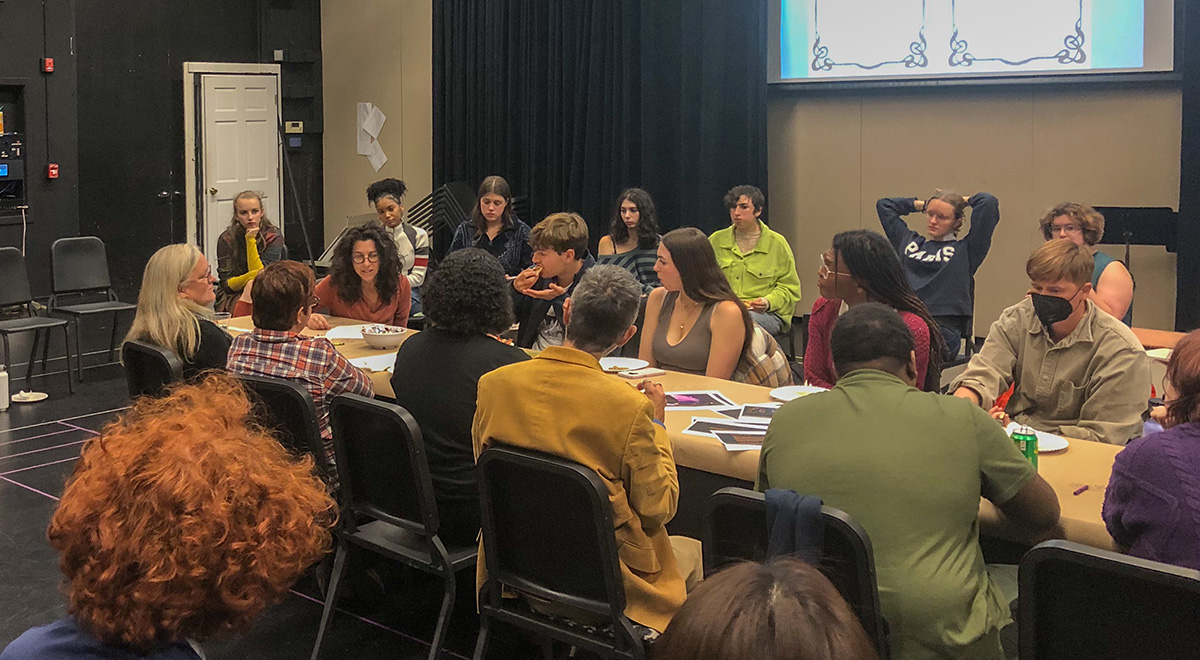Students, Faculty Explore Intersection of Art and Politics

“What is Political About Art?” was the question posed at the Theater Department’s fall Talk It Out and Long Table conversation on October 10. The event was organized by Assistant Professor of Theater Katie Pearl, Associate Professor of Theater and Feminist, Gender, and Sexuality Studies Katie Brewer Ball, and included the student cast of Of Government in the Theater Studios.
Pearl will be directing four performances of Agnes Borinsky’s play Of Government in the CFA Theater Nov. 7 to Nov. 9. The work deals with the connected processes of making theater and making society. “Every time we do a play, we like to open up our conversation to the expertise and the interest of people across campus,” Pearl said.
Brewer Ball suggested trying the Long Table method for the talk. Conceived by artist and activist Lois Weaver, the Long Table facilitates participation and public engagement by reappropriating the dinner table atmosphere as a public forum, and encouraging informal conversations on serious topics. “I always thought it was a really interesting kind of democratic, horizontal, and alternate way to have a conversation,” Brewer Ball said.
At the start of the event, Pearl said the Long Table would be a self-propelled conversation with an end, but no conclusion. “So this is not a conversation that we’re going to solve. It’s just a conversation that we’re all interested in having together,” Pearl said.
During the 90-minute conversation, Pearl noted that government or politics are among the shapers of what makes a society function. In the introduction to the play, Borinsky quotes from David Graeber’s Toward an Anthropological Theory of Value. “I feel like we’re sort of in this fight right now in our country where the ultimate freedom is not the freedom to create or accumulate value, but the freedom to decide, collectively or individually, what it is that makes life worth living,” Pearl said, referring to the work. “In the end, then, politics is about the meaning of life—and then, I think art is about responding to, or making meaning out of, our lives.”
Pearl also suggested that art is like kryptonite in Superman. “The political nature of art is that it is dangerous, and things that are dangerous are inherently political,” Pearl said.
Associate Professor of the Practice in the Allbritton Center for the Study of Public Life and Environmental Studies Amy Grillo said she has written about art as a way of knowing the world, and wondered how the power of the arts is not more broadly recognized as integral to politics. “I spent my whole life and my whole career looking at the question of ‘how do we decide what constitutes valid academic knowledge?’” Grillo said. The purpose of most art, as well as research, she added, should be to just simply begin a conversation.
Grillo also noted that engaging with art is intrinsically democratic. “With art you inherently have to participate for the art to have meaning,” Grillo said.
Assistant Professor of Film Studies and Global South Asian Studies Sadia Shepard said that in her course FILM 104, “Introduction to Collaborative Documentary Filmmaking,” she instructs students to think about the power of what stories they are telling, and how they are focusing not just their camera, but also their attention. “I think the idea of power in looking is also the power we have as artists,” Shephard said.
Lincoln Turner ’25 will be performing in Of Government as part of his Senior Capstone Project in Theater. He said that art, including music, can be a sounding board to changes emerging in society. “It’s easy to forget how much power art can have, in whatever medium,” Turner said. “I think this rehearsal process has really made me remember that.”
The playwright Borinsky had talked to students in Pearl’s course THEA 433, “Mainstage Production – Performance Practice,” over Zoom a few days prior to the Long Table conversation about how small, mundane efforts and slow, incremental change can ultimately result in larger changes in society.
One of those students, Lane Daniels ’28, said she had to realize that hope might be a really small amount of change that you’re able to do personally. “The show is maybe adjusting my expectations for the way our world works,” Daniels said.

